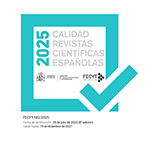Assessment of Quality of Archaeological Data through Vagueness Management – An Application to the Study of Late Roman Settlements
Abstract
The present work, which is part of the PhD of the first author, proposes a measurement of the quality of archaeological data through the management of vagueness, specifically of three variables: uncertainty, imprecision and inaccuracy. If we bear in mind that archaeological data is partial from its origin, assessing its degree of partiality should be one of the objectives from the time the data is obtained in the archaeological interventions and during the whole research process, with the aim that our results show the weaknesses and strengths of our data and are as honest as possible. We will apply the proposed methodology to a case study focused on the analysis of the dynamics of settlement during Late Antiquity, assessing the quality of the data as a preliminary phase to its statistical analysis.
Downloads
Article download
License
In order to support the global exchange of knowledge, the journal Complutum is allowing unrestricted access to its content as from its publication in this electronic edition, and as such it is an open-access journal. The originals published in this journal are the property of the Complutense University of Madrid and any reproduction thereof in full or in part must cite the source. All content is distributed under a Creative Commons Attribution 4.0 use and distribution licence (CC BY 4.0). This circumstance must be expressly stated in these terms where necessary. You can view the summary and the complete legal text of the licence.










